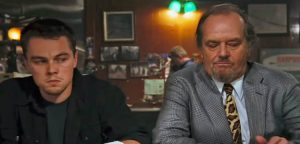
Martin Scorsese has never been one to flirt with respectability for too long, and with The Departed, he’s back in the sewer with old friends and familiar faces. While I was not one of those who felt Gangs of New York and The Aviator were tragic misfires, I do remember being a bit disappointed by the absence of Scorsese’s unique voice that was usually felt in every lovingly crafted frame. As one of cinemas most gifted talents, he’s never made a complete bomb (though Kundun was close), but until his latest, I had assumed that his recent mainstream overtures were signs that he was willing to retreat from his signature style in an effort to secure short-term (read: commercial) success. His stabs at epic grandeur worked in their own way, but weren’t quite enough to warrant a man of Scorsese’s breadth and scope.
Any number of directors could have handled the task with similar results. But here, the little man has once again achieved greatness; exploring an admittedly overexposed genre to be sure, but with storytelling skill so tight and assured that it sweeps aside pale imitators with almost effortless abandon. The result is so absorbing and masterfully constructed that the 2-hour running time seems to pass by in mere moments. And while the inevitable comparisons to Goodfellas will follow, it seems not an insult — but rather the most admiring tribute — to insist that the familiarity lulls us into a warm, delightful comfort, rather than breeding the proverbial contempt.
By this time, we’re used to the betrayals, convoluted games, and overlapping double-crosses of the cops and robber’s arena, but rarely have they been laced with this level of futility and cynicism. Each and every character, including the otherwise unnecessary police psychiatrist (played with anonymous indifference by Vera Farmiga), is dishonest to the core, raising the dispersal of lies to a high art. Billy Costigan (Leonardo DiCaprio) has dreams of becoming a member of the Boston State Police Department, but is instead recruited for key undercover work. Colin Sullivan (Matt Damon) is reared from childhood to be a right-hand man of Irish mob boss Frank Costello (Jack Nicholson), so he works his way through police training to act as a key insider.
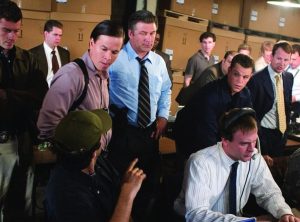
And Mark Wahlberg is Dignam, a fiery, acid-tongued bastard who appears to be a devoted member of the thin blue line, but just might harbor secrets of his own. Even members of Costello’s crew, all seemingly loyal to the cause of perpetuating Franks criminal empire, are surely pulled in numerous directions, tempted as they are by whispers of money and promises of power. Frank himself, played with delightful nastiness by the always reliable Nicholson, is far from a one-dimensional tough guy, and his revelation is the most surprising of all, as we would expect that at the very least, he would be most content to be himself.
In the telling, these characters appear to be temporary escapees from the cliche bin rather than fully realized creations, but it would be a mistake to expect that Scorsese is out to remake the crime film. Instead, he’s reinvigorated it; investing the action and script with unbridled, almost child-like intensity, and has a sense of play that has been missing since Casino. The camera moves, darts, swoops, and flows, and with an undercurrent of music never absent from the soundtrack, a brilliant tension is created and sustained, even when the guns are temporarily put aside.
Sure, these people are vile, greedy, and unrepentantly evil, but rather than apply a somber self-righteousness to the proceedings, Scorsese wants us to add our own nervous laughter to the horror. It’s debatable whether or not he’s romanticizing these folks (though he surely seems most comfortable with them), but it is clear that within this world — and there really is no larger context, save a pungent little stab at the Patriot Act — the prevailing values punish betrayal most of all. It’s well and good that people kill (one of the best scenes involves Costello waltzing from a back room bathed in blood, as if he’s been slaughtering pigs), just don’t rat on your friends. Period. It’s the message of all mob pictures, but here, it felt as if the film itself excused all other behavior.
Anything else would have rung false. And what’s to be done when everyone involved — including those most ferociously enforcing the code — are rats themselves? In that sense, then, the bloodbath that follows is a righteous cleansing. They’re all frauds, so all must die. Leave no one standing. It’s as if Scorsese is finally revealing that the bastards can’t even live up to their own bullshit.
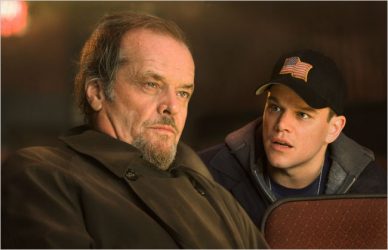
With a man on the inside of Costello’s kingdom and another tucked away in the government, there really is no one to root for, which is a refreshing turn given cinemas tendency to choose sides, expecting us to follow. Nevertheless, as cell phones ring and vibrate, codes are exchanged, and deals go down, it is impossible not to get caught up in the thrills, primarily because we know that within the lies, there are even more lies waiting to be uncovered at a moment’s notice. Because no one is above suspicion (even the seemingly upstanding cop Oliver Queenan, played by a grizzled Martin Sheen, has us asking questions), we no longer have to concern ourselves with fairness and closure.
All have danced with the devil, tasted sin, and have trafficked in dishonesty so long that they have no idea who they are anymore. As such, we study characters, rather than the resolution of plot. Near the end, Billy seems to care about little else than the return of his identity, which for me is the driving theme for all involved, though Billy might have more at stake. After all, he’s been a witness to murder, has actively participated in savage violence, and has had to endure sleepless nights, unbearable anxiety, and the sort of life that could, at any second, end in a great deal of pain. Any similarities to our fighting men are purely coincidental.
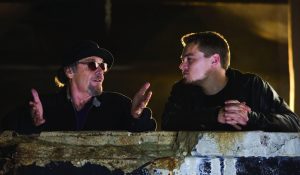
The screenplay is literally teeming with tough, muscular dialogue (were it not for the vapid therapist, the whole thing would be more than a little homoerotic), and though Wahlberg steals many a scene, the film of course belongs to Jack, who, at 69 years old, is still able to wield a fake penis with as much conviction as a man half his age. Of course he’s a ham-fisted monster, but would we buy him as anything else? Mobsters have to possess a certain degree of self-control (how else would they rise to the top), but at bottom, their capacity for heartless brutality, tinged with madness, must know no bounds. You have to keep your underlings on constant edge, believing of course that a devotion to duty is rewarded, but that the notion of duty itself is ever-changing. Nicholson understands this, and gives the character the expected loopy irrationality, topped by an overriding sense of self-preservation. He’s exactly as he must be: ruthless in his belief that everyone falls into line, but able to turn that belief upon itself and lay everyone low to save his own skin.
Indeed, he punishes in others what he’s more than willing to do himself. Why else is he unable to trust a living soul? At the very least, though, Costello embodies the paradox of the criminal genius. We loathe his passion for violence and narcissistic rage, but at any given moment, he’s the most fascinating person in the room. More than that, he’s able to have fun with what he does. While his worker bees stand at attention or move about with grim determination, Costello is snorting coke with big-chested whores, sporting garish robes, and laughing like a hyena. He alone is most alive.
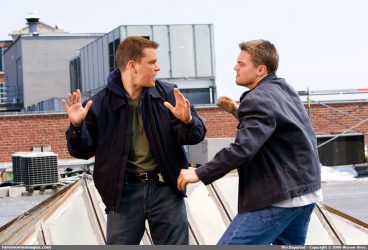
Knowing that Catholic guilt and the idea of redemption are forever gnawing at Scorsese, I’d like to believe that with this film, he has finally given up the ghost and understands faiths cruel trap. The Departed, a Boston story through and through (which means its also an Irish Catholic tale), has some wonderful jabs at the clergy (Costello humiliates a nun and two priests in a diner, as well as peppering numerous conversations with assaults on their lust for buggery) but more tellingly, seems to dispose of the very idea that there is anything left to believe in. The city is rotten, those entrusted with our protection are corrupt scumbags, the symbols of moral order are the least inclined to uphold the very tenets they have established, and now, to make matters worse, the criminal element is eating its own. There are no rules that carry weight, no leaders left to follow, and as for causes, what on earth is left untainted by scandal, corruption, and hypocrisy?
Just as Clint Eastwood took the whole of his career, examined its implications, and wrapped it up with the moral rot of Unforgiven (We all have it coming, kid), Scorsese has a final thought of his own: Were all on our way out, act accordingly. Cops, robbers, men, women, what’s the difference? We’re all playing a game with ourselves and each other, and the pretense is fading fast. Few even care to hide their deception any longer, and perhaps there will soon come a time when criminal kingpins openly serve in government, at last having crossed that phony line that alleges to separate the two. But as Billy’s funeral proves, we’re still clinging to the illusion that there’s right and then there’s wrong, and we all retain the wisdom to know the difference.